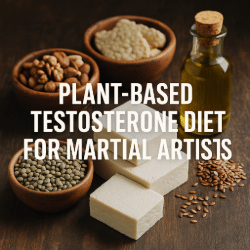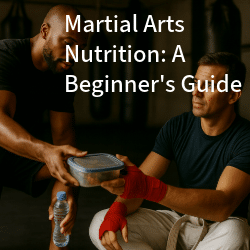Why Martial Artists Care About Testosterone
Testosterone isn’t just a “bodybuilder’s hormone.” For martial artists—men and women—it plays a direct role in muscle recovery, energy, bone health, and even mental edge. While levels naturally decline with age, diet is one of the levers you can pull to support your body’s own production.
A plant-based diet—whether vegetarian or vegan—can be more than adequate for supporting healthy testosterone if you understand how to structure it. In fact, research suggests that overall dietary pattern, body composition, and key nutrient intake matter far more than whether you eat animal products .
Core Building Blocks of a Plant-Based Testosterone Diet
1. Lentils and Other Legumes
Why: High in protein, zinc, and iron—minerals associated with testosterone balance .
How to use: Lentil stews, chickpea curries, black bean wraps.
Pro tip: Pair with vitamin-C rich foods (tomatoes, bell peppers) to improve iron absorption.
2. Tofu and Tempeh
Why: Rich in protein, calcium (if fortified), and phytoestrogens—compounds often misunderstood.
The soy myth: Despite rumors, soy does not lower testosterone. Multiple meta-analyses show no significant effect on male hormone levels . In fact, soy is associated with heart health and longevity benefits.
How to use: Grilled tempeh as a post-training protein source; tofu scrambles for breakfast.
3. Nuts and Seeds
Why: Provide healthy fats, magnesium, zinc, and arginine, all linked to testosterone function .
Best picks:
Almonds & cashews → magnesium and zinc.
Pumpkin seeds → one of the best plant sources of zinc.
Walnuts & flaxseeds → ALA omega-3s.
How to use: Add to smoothies, sprinkle on stir-fries, or mix into energy balls for quick recovery fuel.
4. Omega-3s from Algae Oil
Why: Plant-based athletes often lack DHA and EPA, the omega-3s most linked to hormone health and anti-inflammation .
Solution: Algae oil supplements—direct source of DHA/EPA without fish.
Dose: Most studies suggest 250–500 mg combined DHA/EPA daily.
5. Fortified Foods and B12
Why: Vitamin D and B12 deficiencies can directly impair testosterone and energy .
Sources: Fortified plant milks, nutritional yeast, cereals, or supplementation.
Quick check: If you train indoors often, consider vitamin D supplementation, since deficiency is widespread in athletes.
The Role of Micronutrients
Testosterone production requires a web of minerals and vitamins:
Zinc: Beans, pumpkin seeds, cashews.
Magnesium: Dark leafy greens, almonds, black beans.
Iron: Lentils, tofu, quinoa (pair with vitamin C).
Vitamin D: Sunshine or fortified foods.
B vitamins: Whole grains, fortified cereals, nutritional yeast.
Sample 1-Day Plant-Based Testosterone Diet for Martial Artists
Breakfast
Tofu scramble with spinach, bell peppers, and turmeric
Whole-grain toast with avocado
Fortified soy milk latte
Post-Training Snack
Smoothie with pea protein powder, frozen berries, flaxseed, and almond butter
Lunch
Lentil and quinoa salad with pumpkin seeds, kale, and lemon-tahini dressing
Snack
Tempeh jerky or hummus with carrots and cucumbers
Dinner
Stir-fried tofu with broccoli, cashews, and ginger
Brown rice on the side
Glass of fortified oat milk
Supplemental Support
Algae oil capsule (DHA/EPA)
B12 tablet (if not covered by fortified foods)
Addressing the Soy and Testosterone Myth
Many martial artists worry: “Won’t soy lower my testosterone or increase estrogen?” The short answer is no.
Meta-analysis of 41 studies: No significant effect of soy or isoflavone intake on testosterone or estrogen levels in men .
Practical implication: You can enjoy tofu, tempeh, or soy milk without fear of “feminizing” effects. The real risk is cutting soy out and losing one of the best protein sources available to plant-based athletes.
Women and Testosterone on a Plant-Based Diet
For women martial artists, testosterone is equally important—though at lower baseline levels. Benefits include:
Better bone density (critical in high-impact martial arts).
Support for lean muscle preservation.
Energy stability and reduced overtraining risk.
Plant-based nutrition supports women just as well as men, provided protein, iron, and B12 are prioritized.
Practical Tips for Martial Artists Transitioning to Plant-Based Testosterone Diets
Prioritize protein variety: Mix legumes, soy, nuts, seeds, and whole grains.
Don’t fear carbs: Whole grains and legumes provide steady energy for long sparring sessions.
Supplement smart: Algae oil, B12, and sometimes vitamin D are the non-negotiables.
Track your recovery: If soreness lingers, consider whether protein timing or omega-3 intake needs adjustment.
Plan meals around training: Aim for 20–30 grams of protein within an hour after hard sessions.
Takeaway
A plant-based testosterone diet for martial artists isn’t about “avoiding deficiency.” Done right, it can be a powerful way to recover faster, fight longer, and maintain balanced hormones—without relying on animal products.
Whether you’re vegetarian or fully vegan, focusing on legumes, soy, nuts and seeds, fortified foods, and algae oil gives you all the building blocks to keep your testosterone—and your martial arts—at their best.
References
Allen NE et al. Diet and hormone-related cancers: does a vegetarian diet reduce risk? Br J Cancer. 2002.
Hooper L et al. Effects of dietary soy protein and isoflavones on risk factors for CHD. Cochrane Database. 2020.
Messina M. Soy and health update: Evaluation of the clinical and epidemiologic literature. Nutrients. 2016.
Maggio M et al. Magnesium and anabolic hormones in older men. Int J Androl. 2011.
Derbyshire E. Plant-based omega-3s: A practical approach. Nutrients. 2017.
Pilz S et al. Vitamin D and testosterone in men. Clin Endocrinol (Oxf). 2011.
Plant‑Based Testosterone Diet FAQ for Martial Artists
Does soy lower testosterone?
No. Multiple meta-analyses show soy and isoflavones do not reduce testosterone in men. Tofu and tempeh are excellent protein options for plant-based athletes.
Can a vegan diet support strength and recovery?
Yes, if you plan it. Combine legumes, soy foods, whole grains, nuts/seeds, and fortified foods to meet protein, iron, zinc, B12, and vitamin D needs.
Which plant foods matter most for testosterone support?
Lentils/legumes (iron, zinc), tofu/tempeh (complete protein), nuts/seeds (healthy fats, magnesium, zinc), fortified plant milks (B12, vitamin D), and algae oil (DHA/EPA).
Do women martial artists need to think about testosterone?
Yes. Healthy testosterone supports bone density, lean mass, and energy. The same plant-based strategy applies—prioritize protein, iron, B12, vitamin D, and omega‑3s.
How much protein should I aim for?
General athletic ranges are ~1.6–2.2 g/kg body weight/day. Post‑training, target 20–30 g protein within ~60 minutes.
Is algae oil really necessary if I use flax or chia?
Flax/chia provide ALA; algae oil provides DHA/EPA directly and is a reliable vegan source for anti‑inflammation and recovery.
What fortified foods should I include?
Plant milks and cereals with vitamin D and B12; nutritional yeast for B‑vitamins. Verify labels and dose as needed.
Any quick day plan I can follow?
Yes—see the 1‑Day plan in the article: tofu scramble breakfast, post‑training smoothie, lentil‑quinoa lunch, tempeh or hummus snack, tofu‑cashew stir‑fry dinner, plus B12 and algae oil.
Educational content, not medical advice. Consult a qualified clinician or dietitian for personal needs.



